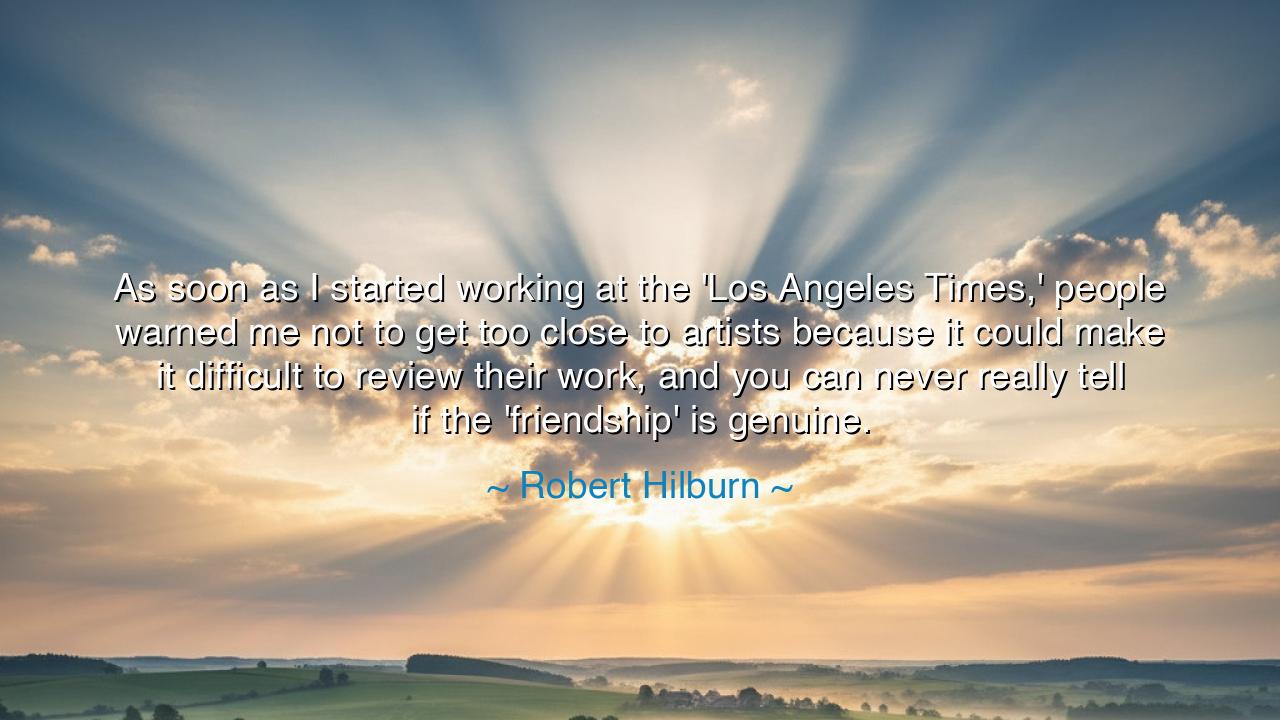
As soon as I started working at the 'Los Angeles Times,' people
As soon as I started working at the 'Los Angeles Times,' people warned me not to get too close to artists because it could make it difficult to review their work, and you can never really tell if the 'friendship' is genuine.






The music critic Robert Hilburn, a man who spent decades chronicling the lives and works of the greatest artists of the modern age, once said: “As soon as I started working at the 'Los Angeles Times,' people warned me not to get too close to artists because it could make it difficult to review their work, and you can never really tell if the 'friendship' is genuine.” Beneath these words lies a profound and uneasy truth about the human heart—about the delicate balance between integrity and affection, between the calling of truth and the yearning for connection. Hilburn’s reflection is not merely a note about journalism—it is a meditation on the eternal tension between honesty and attachment, a lesson as relevant to life as it is to art.
The meaning of this quote touches the soul of anyone who has ever sought to live by principle in a world ruled by emotion. Hilburn was not only describing the challenge of criticism but of all human endeavor where judgment meets intimacy. To be close to another is to risk blindness; to love, in any form, is to risk losing objectivity. Yet to live without connection is to wither. His words are a confession of this tightrope walk: the critic must see clearly, yet not coldly; must admire, yet not be seduced; must hold the truth higher than favor, even when affection pleads for compromise. This is a battle that all who serve truth must wage—the battle between the heart and the mind.
The origin of this wisdom can be traced to the dawn of art and power itself. In every age, those who speak truth to beauty have faced this dilemma. The philosopher Socrates, beloved by many in Athens, was ultimately condemned by the very society he sought to awaken. His closeness to the youth and thinkers of his city made him both admired and distrusted. Like Hilburn, he knew that intimacy can blur judgment, that affection can soften the will to speak hard truths. Yet he refused to abandon integrity for approval, drinking the hemlock with calm dignity rather than renouncing what he believed. So too, Hilburn’s caution reminds us that to guard one’s moral clarity is to protect the sacred flame of truth from the winds of favor.
History is filled with tales of artists and critics whose relationships illustrate the fragile boundary between admiration and honesty. Consider Samuel Taylor Coleridge and William Wordsworth, two poets bound by friendship and genius. Their partnership birthed the Romantic movement, yet their closeness also bred tension—Coleridge’s critiques of Wordsworth’s poetry strained their bond, while Wordsworth’s ambition sometimes overshadowed his friend’s brilliance. Both men struggled to reconcile truth and loyalty, a struggle that eventually led to silence between them. Their story, like Hilburn’s reflection, teaches that friendship born in creative pursuit is both a blessing and a trial—it demands courage to speak truth and humility to receive it.
Hilburn’s warning also reflects a deeper emotional truth: the uncertainty of human motives. “You can never really tell if the ‘friendship’ is genuine,” he writes, and within that line lies centuries of human doubt. When success and fame are involved, sincerity becomes clouded by self-interest. The artist may seek praise, the critic validation, and both may mistake admiration for affection. It is a loneliness known to all who stand near greatness—where the glow of fame warms but also deceives. To recognize this truth is not cynicism but wisdom: the understanding that true friendship can only exist where honesty is safe, and respect is mutual.
Yet, there is also tenderness in Hilburn’s restraint. His caution is not born of bitterness, but of reverence—for the sanctity of art and the integrity of judgment. He understood that proximity can corrupt not because people are evil, but because hearts are soft. The critic who grows too fond of the artist may lose the courage to confront imperfection; the artist who befriends the critic may expect mercy where none is due. And so, Hilburn chose distance not out of coldness, but out of devotion—to protect both truth and affection from the corrosion of compromise. His wisdom teaches us that boundaries are not walls—they are forms of love, preserving what is sacred in both art and friendship.
The lesson we draw from his words reaches far beyond the newsroom or the stage. In our own lives, we must learn to balance compassion with clarity, empathy with discernment. Be kind, but not blind. Love others, but never at the cost of your integrity. When called to speak truth, do so with grace—but speak it nonetheless. And when friendship is tested by honesty, trust that truth spoken with sincerity strengthens rather than destroys. The truest bonds, whether between artist and critic, leader and follower, or friend and friend, are those that survive the light of truth.
So let Robert Hilburn’s reflection stand as a modern echo of an ancient teaching: that truth and friendship must walk hand in hand, but never in each other’s shadow. To seek genuine connection while remaining faithful to integrity is one of life’s highest disciplines. For in the end, it is better to lose the favor of others than to lose the trust of one’s own conscience—and better to stand alone in truth than surrounded by friendship built on illusion.






AAdministratorAdministrator
Welcome, honored guests. Please leave a comment, we will respond soon